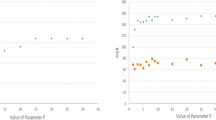Abstract
When the nonlinear complementarity problem is reformulated as that of finding the zero of a self-mapping, the norm of the selfmapping serves naturally as a merit function for the problem. We study the growth behavior of such a merit function. In particular, we show that, for the linear complementarity problem, whether the merit function is coercive is intimately related to whether the underlying matrix is aP-matrix or a nondegenerate matrix or anR o-matrix. We also show that, for the more popular choices of the merit function, the merit function is bounded below by the norm of the natural residual raised to a positive integral power. Thus, if the norm of the natural residual has positive order of growth, then so does the merit function.
Similar content being viewed by others
References
Cottle, R. W., Giannessi, F., andLions, J. L., Editors,Variational Inequalities and Complementarity Problems: Theory and Applications, John Wiley and Sons, New York, New York, 1980.
Isac, G.,Complementarity Problems, Lecture Notes in Mathematics, Springer Verlag, New York, New York, Vol. 1528, 1992.
Pang, J. S.,Complementarity Problems, Handbook on Global Optimization, Edited by R. Horst and P. Pardalos, Kluwer Academic Publishers, Norwell, Massachusetts, 1994.
Cottle, R. W., Pang, J. S., andStone, R. E.,The Linear Complementarity Problem, Academic Press, New York, New York, 1992.
Mangasarian, O. L.,Equivalence of the Complementarity Problem to a System of Nonlinear Equations, SIAM Journal on Applied Mathematics, Vol. 31, pp. 89–92, 1976.
Evtushenko, Y. G., andPurtov, V. A.,Sufficient Conditions for a Minimum for Nonlinear Programming Problems, Soviet Mathematics Doklady, Vol. 30, pp. 313–316, 1984.
Ferris, M. C., andLucidi, S.,Globally Convergent Methods for Nonlinear Equations, Report, Computer Sciences, University of Wisconsin, 1991.
Kanzow, C.,Some Equation-Based Methods for the Nonlinear Complementarity Problem, Optimization Methods and Software, Vol. 3, pp. 327–340, 1994.
Kanzow, C.,Nonlinear Complementarity as Unconstrained Optimization, Journal of Optimization Theory and Applications, Vol. 88, 1996.
Subramanian, P. K.,Gauss-Newton Methods for the Complementarity Problem, Journal of Optimization Theory and Applications, Vol. 77, pp. 467–482, 1993.
Watson, L. T.,Solving the Nonlinear Complementarity Problem by a Homotopy Method, SIAM Journal on Control and Optimization, Vol. 17, pp. 36–46, 1979.
Kanzow, C.,Global Convergence Properties of Some Iterative Methods for Linear Complementarity Problems, Preprint 72, Institut für Angewandte Mathematik, Universität Hamburg, 1993; SIAM Journal on Optimization, Vol. 6, 1996, to appear.
Fischer, A.,A Newton-Type Method for Positive-Semidefinite Linear Complementarity Problems, Journal of Optimization Theory and Applications, Vol. 86, pp. 585–608, 1995.
Fischer, A.,On the Local Superlinear Convergence of a Newton-Type Method for LCP under Weak Conditions, Optimization Methods and Software, Vol. 6, pp. 83–107, 1995.
Kanzow, C., andKleinmichel, H.,A Class of Newton-Type Methods for Equality and Inequality Constrained Optimization, Optimization Methods and Software, Vol. 5, pp. 173–198, 1995.
Fischer, A.,A Special Newton-Type Optimization Method, Optimization, Vol. 24, pp. 269–284, 1992.
Geiger, C., andKanzow, C.,On the Resolution of Monotone Complementarity Problems, Computational Optimization and Applications, Vol. 5, pp. 155–173, 1996.
Hoffman, A. J.,On Approximate Solutions of Systems of Linear Inequalities, Journal of Research for the National Bureau of Standards, Vol. 49, pp. 263–265, 1952.
Luo, Z. Q., andTseng, P.,Error Bounds and Convergence Analysis of Feasible Descent Methods: A General Approach, Annals of Operations Research, Vol. 46, pp. 157–178, 1993.
Kanzow, C., Private Communications, 1994.
Luo, X. D., andTseng, P.,Conditions for a Projection-Type Error Bound for the Linear Complementarity Problem to Be Global, Report, Operations Research, Massachusetts Institute of Technology, 1993; Linear Algebra and Its Applications, to appear.
Luo, Z. Q., Mangasarian, O. L., Ren, J., andSolodov, M. V.,New Error Bounds for the Linear Complementarity Problem, Mathematics of Operations Research, Vol. 19, pp. 880–892, 1994.
Luo, Z. Q., andTseng, P.,On a Global Error Bound for a Class of Monotone Affine Variational Inequality Problems, Operations Research Letters, Vol. 11, pp. 159–165, 1992.
Mangasarian, O. L.,Error Bounds for Nondegenerate Monotone Linear Complementarity Problems, Mathematical Programming, Vol. 48, pp. 437–445, 1990.
Mangasarian, O. L., andRen, J.,New Improved Error Bounds for the Linear Complementarity Problem, Mathematical Programming, Vol. 66, pp. 241–255, 1994.
Mathias, R., andPang, J. S.,Error Bounds for the Linear Complementarity Problem with a P-Matrix, Linear Algebra and Its Applications, Vol. 132, pp. 123–136, 1990.
Pang, J. S.,A Posteriori Error Bounds for the Linearly-Constrained Variational Inequality Problem, Mathematics of Operations Research, Vol. 12, pp. 474–484, 1987.
Tseng, P., Yamashita, N., andFukushima, M.,Equivalence of Complementarity Problems to Differentiable Minimization: A Unified Approach; SIAM Journal on Optimization, Vol. 6, 1996, to appear.
Mangasarian, O. L., andSolodov, M. V.,Nonlinear Complementarity as Unconstrained and Constrained Minimization, Mathematical Programming, Vol. 62, pp. 277–297, 1993.
Yamashita, N., andFukushima, M.,On Stationary Points of the Implicit Lagrangian for Nonlinear Complementarity Problems, Journal of Optimization Theory and Applications, Vol. 84, pp. 653–663, 1995.
Facchinei, F., andSoares, J.,A New Merit Function for Nonlinear Complementarity Problems and a Related Algorithm, Report 15.94, Informatica e Sistemistica, Università di Roma “La Sapienza,” 1994.
Jiang, H., andQi, L.,A New Nonsmooth Equations Approach to Nonlinear Complementarities, Report AMR94/31, School of Mathematics, University of New South Wales, 1994; SIAM Journal on Control and Optimization, to appear.
Kanzow, C., andFukushima, M.,Equivalence of the Generalized Complementarity Problem to Differentiable Unconstrained Minimization, Report, Institut für Angewandte Mathematik, Universität Hamburg, 1995; Journal of Optimization Theory and Applications, Vol. 91, 1996, to appear.
Author information
Authors and Affiliations
Additional information
This work was partially supported by the National Science Foundation Grant No. CCR-93-11621.
The author thanks Dr. Christian Kanzow for his many helpful comments on a preliminary version of this paper. He also thanks the referees for their helpful suggestions.
Rights and permissions
About this article
Cite this article
Tseng, P. Growth behavior of a class of merit functions for the nonlinear complementarity problem. J Optim Theory Appl 89, 17–37 (1996). https://doi.org/10.1007/BF02192639
Issue Date:
DOI: https://doi.org/10.1007/BF02192639



